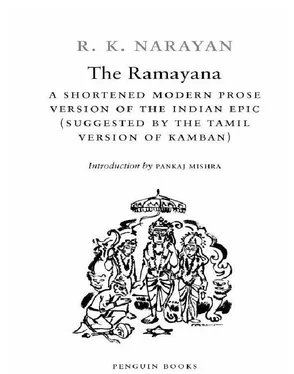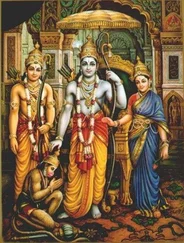Махариши Вальмики - The Ramayana
Здесь есть возможность читать онлайн «Махариши Вальмики - The Ramayana» весь текст электронной книги совершенно бесплатно (целиком полную версию без сокращений). В некоторых случаях можно слушать аудио, скачать через торрент в формате fb2 и присутствует краткое содержание. Жанр: Старинная литература, на английском языке. Описание произведения, (предисловие) а так же отзывы посетителей доступны на портале библиотеки ЛибКат.
- Название:The Ramayana
- Автор:
- Жанр:
- Год:неизвестен
- ISBN:нет данных
- Рейтинг книги:3 / 5. Голосов: 1
-
Избранное:Добавить в избранное
- Отзывы:
-
Ваша оценка:
- 60
- 1
- 2
- 3
- 4
- 5
The Ramayana: краткое содержание, описание и аннотация
Предлагаем к чтению аннотацию, описание, краткое содержание или предисловие (зависит от того, что написал сам автор книги «The Ramayana»). Если вы не нашли необходимую информацию о книге — напишите в комментариях, мы постараемся отыскать её.
The Ramayana — читать онлайн бесплатно полную книгу (весь текст) целиком
Ниже представлен текст книги, разбитый по страницам. Система сохранения места последней прочитанной страницы, позволяет с удобством читать онлайн бесплатно книгу «The Ramayana», без необходимости каждый раз заново искать на чём Вы остановились. Поставьте закладку, и сможете в любой момент перейти на страницу, на которой закончили чтение.
Интервал:
Закладка:
After listening to Hanuman, Rama declared, “I agree with you. After all, one who seeks asylum must be given protection. Whatever may happen later, it is our first duty to protect. Even if I am defeated because I have taken him at his word, I would not mind it; I shall still have done the right thing. On the other hand, if I am victorious in war by rejecting him, to me that victory would not be worth having. One who speaks for himself must be accepted at his face value. One who seeks asylum must be protected. One of my ancestors gave his life to protect a dove which sought his protection from a hawk. I have made up my mind and my friends here please take note of it. Let him be brought in.” He looked at Sugreeva and said, “You should go and tell him that we accept him. Welcome him and bring him here.”
Very soon Sugreeva led Vibishana to Rama’s presence. Rama spoke kind words to him. Vibishana accepted Rama’s friendship with grace and humility. Finally Rama turned to Lakshmana and said, “Treat Vibishana as a ruler of Lanka, but now in exile, and give him all the comforts he needs and all the honours worthy of a king.”
Vibishana explained, “It was not my purpose to seek the crown of Lanka, but since you confer it on me, I have to accept it. Believe me, sir, my only purpose in coming here was to be with you and receive your grace.” Day by day they conferred, and Vibishana explained the disposition of Ravana’s troops, the nature of his weapons, and the strength of his army, all of which enabled Rama to draw up a precise plan of attack on Lanka.
Rama’s next phase of operation was to try and cross the seas. He stood on the shore of the ocean and the more he looked at it, the more desperate he felt as to how he was to cross it with his army. He prayed and fasted for seven days and summoned the sea god and ordered, “Make way for my armies.”
The sea god said, “I am as much subject to the laws of nature as other elements. What can I do?”
Whereupon Rama felt angry and threatened to shoot his arrows into the sea so that all the water might evaporate and facilitate his passage. The sea god implored him to desist and not to destroy the sea and its living creatures, and suggested, “I will accept and put to the best use whatever is brought to me to bridge the sea.”
Rama’s angry mood left him and he said, “So be it.” Very soon his monkey army brought in mud, huge rocks, and even pieces of mountains; men, monkeys, and all animals helped in this task. It was said that even the little squirrel rolled along pebbles to fill up the sea, and a day came when there was a passage created by their combined efforts, and Rama’s army marched across and landed on the soil of Lanka.
11
THE SIEGE OF LANKA 11
Ravana deployed the pick of his divisions to guard the approaches to the capital and appointed his trusted generals and kinsmen in special charge of key places. Gradually, however, his world began to shrink. As the fight developed he lost his associates one by one. No one who went out returned.
He tried some devious measures in desperation. He sent spies in the garb of Rama’s monkey army across to deflect and corrupt some of Rama’s staunchest supporters, such as Sugreeva, on whom rested the entire burden of this war. He employed sorcerers to disturb the mind of Sita, hoping that if she yielded, Rama would ultimately lose heart. He ordered a sorcerer to create a decapitated head resembling Rama’s and placed it before Sita as evidence of Rama’s defeat. Sita, although shaken at first, very soon recovered her composure and remained unaffected by the spectacle.
At length a messenger from Rama arrived, saying, “Rama bids me warn you that your doom is at hand. Even now it is not too late for you to restore Sita and beg Rama’s forgiveness. You have troubled the world too long. You are not fit to continue as King. At our camp, your brother, Vibishana, has already been crowned the King of this land, and the world knows all people will be happy under him.”
Ravana ordered the messenger to be killed instantly. But it was more easily said than done, the messenger being Angada, the son of mighty Vali. When two rakshasas came to seize him, he tucked one of them under each arm, rose into the sky, and flung the rakshasas down. In addition, he kicked and broke off the tower of Ravana’s palace, and left. Ravana viewed the broken tower with dismay.
Rama awaited the return of Angada, and, on hearing his report, decided that there was no further cause to hope for a change of heart in Ravana and immediately ordered the assault on Lanka.
As the fury of the battle grew, both sides lost sight of the distinction between night and day. The air was filled with the cries of fighters, their challenges, cheers, and imprecations; buildings and trees were torn up and, as one of his spies reported to Ravana, the monkeys were like a sea overrunning Lanka. The end did not seem to be in sight.
At one stage of the battle, Rama and Lakshmana were attacked by Indrajit, and the serpent darts employed by him made them swoon on the battlefield. Indrajit went back to his father to proclaim that it was all over with Rama and Lakshmana and soon, without a leader, the monkeys would be annihilated.
Ravana rejoiced to hear it and cried, “Did not I say so? All you fools believed that I should surrender.” He added, “Go and tell Sita that Rama and his brother are no more. Take her high up in Pushpak Vimana, my chariot, and show her their bodies on the battlefield.” His words were obeyed instantly. Sita, happy to have a chance to glimpse a long-lost face, accepted the chance, went high up, and saw her husband lying dead in the field below. She broke down. “How I wish I had been left alone and not brought up to see this spectacle. Ah, me . . . Help me to put an end to my life.”
Trijata, one of Ravana’s women, whispered to her, “Don’t lose heart, they are not dead,” and she explained why they were in a faint.
In due course, the effect of the serpent darts was neutralized when Garuda, the mighty eagle, the born enemy of all serpents, appeared on the scene; the venomous darts enveloping Rama and Lakshmana scattered at the approach of Garuda and the brothers were on their feet again.
From his palace retreat Ravana was surprised to hear again the cheers of the enemy hordes outside the ramparts; the siege was on again. Ravana still had about him his commander-in-chief, his son Indrajit, and five or six others on whom he felt he could rely at the last instance. He sent them one by one. He felt shattered when news came of the death of his commander-in-chief.
“No time to sit back. I will myself go and destroy this Rama and his horde of monkeys,” he said and got into his chariot and entered the field.
At this encounter Lakshmana fell down in a faint, and Hanuman hoisted Rama on his shoulders and charged in the direction of Ravana. The main combatants were face to face for the first time. At the end of this engagement Ravana was sorely wounded, his crown was shattered, and his chariot was broken. Helplessly, bare-handed, he stood before Rama, and Rama said, “You may go now and come back tomorrow with fresh weapons.” For the first time in his existence of many thousand years, Ravana faced the humiliation of accepting a concession, and he returned crestfallen to his palace.
He ordered that his brother Kumbakarna, famous for his deep sleep, should be awakened. He could depend upon him, and only on him now. It was a mighty task to wake up Kumbakarna. A small army had to be engaged. They sounded trumpets and drums at his ears and were ready with enormous quantities of food and drink for him, for when Kumbakarna awoke from sleep, his hunger was phenomenal and he made a meal of whomever he could grab at his bedside. They cudgelled, belaboured, pushed, pulled, and shook him, with the help of elephants; at last he opened his eyes and swept his arms about and crushed quite a number among those who had stirred him up. When he had eaten and drunk, he was approached by Ravana’s chief minister and told, “My lord, the battle is going badly for us.”
Читать дальшеИнтервал:
Закладка:
Похожие книги на «The Ramayana»
Представляем Вашему вниманию похожие книги на «The Ramayana» списком для выбора. Мы отобрали схожую по названию и смыслу литературу в надежде предоставить читателям больше вариантов отыскать новые, интересные, ещё непрочитанные произведения.
Обсуждение, отзывы о книге «The Ramayana» и просто собственные мнения читателей. Оставьте ваши комментарии, напишите, что Вы думаете о произведении, его смысле или главных героях. Укажите что конкретно понравилось, а что нет, и почему Вы так считаете.












